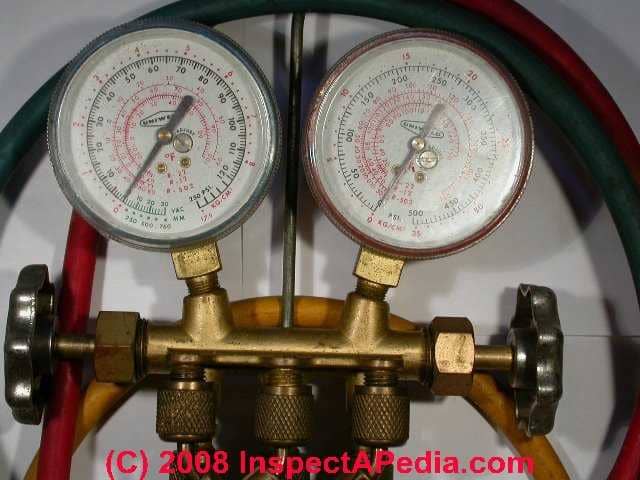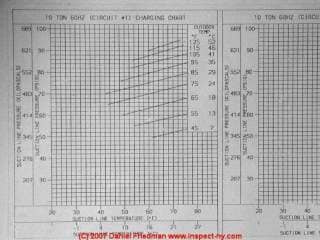 Air Conditioner / Heat Pump Refrigerant Pressure Too Low - Undercharged
Air Conditioner / Heat Pump Refrigerant Pressure Too Low - Undercharged
Effects of a low charge, under-charged refrigerant pressures and leaks: not enough refrigerant
- POST a QUESTION or COMMENT about refrigerant pressure readings in air conditioners, heat pumps, & other refrigeration equipment
Low refrigerant or refrigerant undercharge effects on air conditioners & heat pumps or other HVACR equipment:
This article explains the symptoms of and problems caused by not enough refrigerant in cooling equpment.
Refrigerant charge quantity for air conditioners & heat pumps:
This air conditioning repair article series discusses the the diagnosis and correction of abnormal air conditioner refrigerant line pressures as a means for evaluating the condition of the air conditioner compressor motor, which in turn, is a step in how we evaluate and correct lost or reduced air conditioner cooling capacity.
We explain how overcharging or undercharging of refrigerant in an air conditioner or heat pump is detected and we list the effects of overcharged or undercharged refrigerant. We also explain the various causes of liquid slugging a compressor motor.
InspectAPedia tolerates no conflicts of interest. We have no relationship with advertisers, products, or services discussed at this website.
- Daniel Friedman, Publisher/Editor/Author - See WHO ARE WE?
Effects of Undercharging the Refrigerant Level in an Air Conditioner, Heat Pump, or other refrigeration equipment
 Effect of too little refrigerant in the system
Effect of too little refrigerant in the system
When we undercharge an air conditioner, heat pump, or other refrigeration equipment
- Improper operating refrigerant pressures, too low: surprisingly to the novice, too little refrigerant in the system can actually drop the temperature in the cooling coil below its normal operating range; that's why we mention
at FROST BUILD-UP on AIR CONDITIONER COILS that a cause of coil frosting in the air handler might be an early sign of a refrigerant leak.
Loss of cooling capability: eventually when enough refrigerant leaks out of the system temperatures rise again because we no longer have any heat exchange between the condenser coil and the outdoor air nor between the then empty cooling coil and the indoor air. - More expensive operation: There is not enough refrigerant in the system, for example to properly fill the cooling coil
- then we remove less heat (per unit of time operation of the equipment) so we are decreasing the operating efficiency of the system. - Cooling Coil Frosting: Too-low refrigerant levels in some systems also can cause frosting and freezing at the cooling coil.
- Compressor motor damage: Too little refrigerant in an air conditioner, heat pump, refrigerator, or even a dehumidifier is likely to cause overheating of the compressor motor. That is because in a properly-charged refrigeration system, the refrigerant is cooling the electric motor that is sealed inside the compressor unit.
An overheated A/C motor may trip a circuit breaker, may have trouble starting, and eventually will fail to run at all.
Watch out: when an air conditioner or heat pump motor "burns out" the result is a costly contamination of the entire refrigeration system as burned lubricants and even shellac or coatings on motor windings will have been circulated through the refrigerant piping system.
That's why an experienced HVAC repair person will insist on cleaing the entire system and installing one or more "burnout" refrigerant filter/driers) on the refrigerant lines when the compressor is replaced.
See REFRIGERANT DRIERS & FILTERS
Bottom line about undercharging refrigerants: For residential equipment such as air conditioners, heat pumps, refrigerators, freezers, to work properly you must have exactly the correct charge in the system.
at FROST BUILD-UP on AIR CONDITIONER COILS we also explain that in a properly tuned and adjusted refrigeration system there will be liquid refrigerant found all the way to just at the end of the evaporator coil - this gives us maximum cooling efficiency of the equipment.
Effects of Overcharging the Refrigerant Level in an Air Conditioner, Heat Pump, or other refrigeration equipment
The effect of too much refrigerant in the system - overcharging, over-metering, or other high refrigerant pressure situations are detailed
at EFFECTS of OVER CHARGING of REFRIGERANT
If your air conditioning or heat pump system has lost its cooling capacity or won't start
see REPAIR GUIDE for AIR CONDITIONERS.
...
Continue reading at THERMOSTATIC EXPANSION VALVE TEV INSTALL, DIAGNOSE, REPAIR or select a topic from the closely-related articles below, or see the complete ARTICLE INDEX.
Or see these
Recommended Articles
- PRESSURE CONTROLS & SAFETY SWITCHES
- REFRIGERANT CHARGING PROCEDURE
- REFRIGERANT PRESSURE READINGS & CHARTS
- REFRIGERANT GASES & PIPING - home
- CAR / TRUCK AC PRESSURE SWITCH
- FROST BUILD-UP on AIR CONDITIONER COILS
- GAS DETECTION INSTRUMENTS
- GAS EXPOSURE EFFECTS, TOXIC
- GAS LAWS & CONSTANTS
- GAUGE, REFRIGERATION PRESSURE TEST
- REFRIGERANT CHARGING PROCEDURE
- REFRIGERANT DRIERS & FILTERS
- REFRIGERANT FLOODBACK, LIQUID SLUGGING
- REFRIGERANT LEAK DETECTION
- REFRIGERANT LEAK REPAIR
- REFRIGERANT LINE FROST or ICE
- REFRIGERANT METERING DEVICES TEVs & EEVs
- REFRIGERANT METERING CAPILLARY TUBES
- REFRIGERANT OVERCHARGE EFFECTS
- REFRIGERANT PIPING INSTALLATION
- REFRIGERANT PRESSURE DIAGNOSIS
- REFRIGERANT PRESSURE READINGS & CHARTS
- REFRIGERANT PROBLEM TYPES
- REFRIGERANT UNDERCHARGE EFFECTS
- REFRIGERANT SIGHT GLASS
- SPLIT SYSTEM AC / HEAT PUMP REPAIRS
Suggested citation for this web page
UNDER CHARGED REFRIGERANT, EFFECTS at InspectApedia.com - online encyclopedia of building & environmental inspection, testing, diagnosis, repair, & problem prevention advice.
Or see this
INDEX to RELATED ARTICLES: ARTICLE INDEX to AIR CONDITIONING & HEAT PUMPS
Or use the SEARCH BOX found below to Ask a Question or Search InspectApedia
Ask a Question or Search InspectApedia
Try the search box just below, or if you prefer, post a question or comment in the Comments box below and we will respond promptly.
Search the InspectApedia website
Note: appearance of your Comment below may be delayed: if your comment contains an image, photograph, web link, or text that looks to the software as if it might be a web link, your posting will appear after it has been approved by a moderator. Apologies for the delay.
Only one image can be added per comment but you can post as many comments, and therefore images, as you like.
You will not receive a notification when a response to your question has been posted.
Please bookmark this page to make it easy for you to check back for our response.
IF above you see "Comment Form is loading comments..." then COMMENT BOX - countable.ca / bawkbox.com IS NOT WORKING.
In any case you are welcome to send an email directly to us at InspectApedia.com at editor@inspectApedia.com
We'll reply to you directly. Please help us help you by noting, in your email, the URL of the InspectApedia page where you wanted to comment.
Citations & References
In addition to any citations in the article above, a full list is available on request.
- Complete List of Air Conditioning & Heat Pump Design, Inspection, Repair Books at the InspectAPedia Bookstore.
- Modern Refrigeration and Air Conditioning, A. D. Althouse, C.H. Turnquist, A. Bracciano, Goodheart-Willcox Co., 1982
- Principles of Refrigeration, R. Warren Marsh, C. Thomas Olivo, Delmar Publishers, 1979
- Refrigeration and Air Conditioning Technology, 5th Ed., William C. Whitman, William M. Johnson, John Tomczyk, Cengage Learning, 2005, ISBN 1401837654, 9781401837655 1324 pages
- Carson Dunlop, Associates, Toronto, have provided us with (and we recommend) Carson Dunlop Weldon & Associates'Technical Reference Guide to manufacturer's model and serial number information for heating and cooling equipment ($69.00 U.S.).
- In addition to citations & references found in this article, see the research citations given at the end of the related articles found at our suggested
CONTINUE READING or RECOMMENDED ARTICLES.
- Carson, Dunlop & Associates Ltd., 120 Carlton Street Suite 407, Toronto ON M5A 4K2. Tel: (416) 964-9415 1-800-268-7070 Email: info@carsondunlop.com. Alan Carson is a past president of ASHI, the American Society of Home Inspectors.
Thanks to Alan Carson and Bob Dunlop, for permission for InspectAPedia to use text excerpts from The HOME REFERENCE BOOK - the Encyclopedia of Homes and to use illustrations from The ILLUSTRATED HOME .
Carson Dunlop Associates provides extensive home inspection education and report writing material. In gratitude we provide links to tsome Carson Dunlop Associates products and services.

